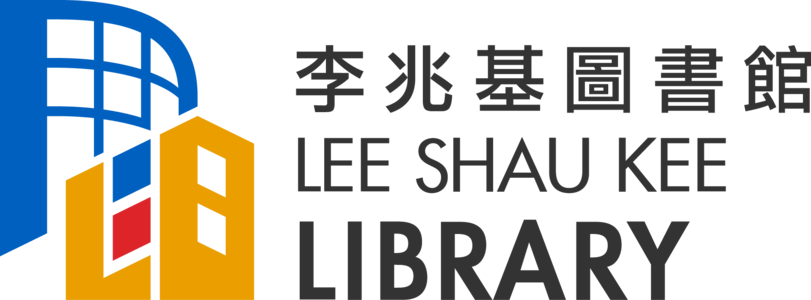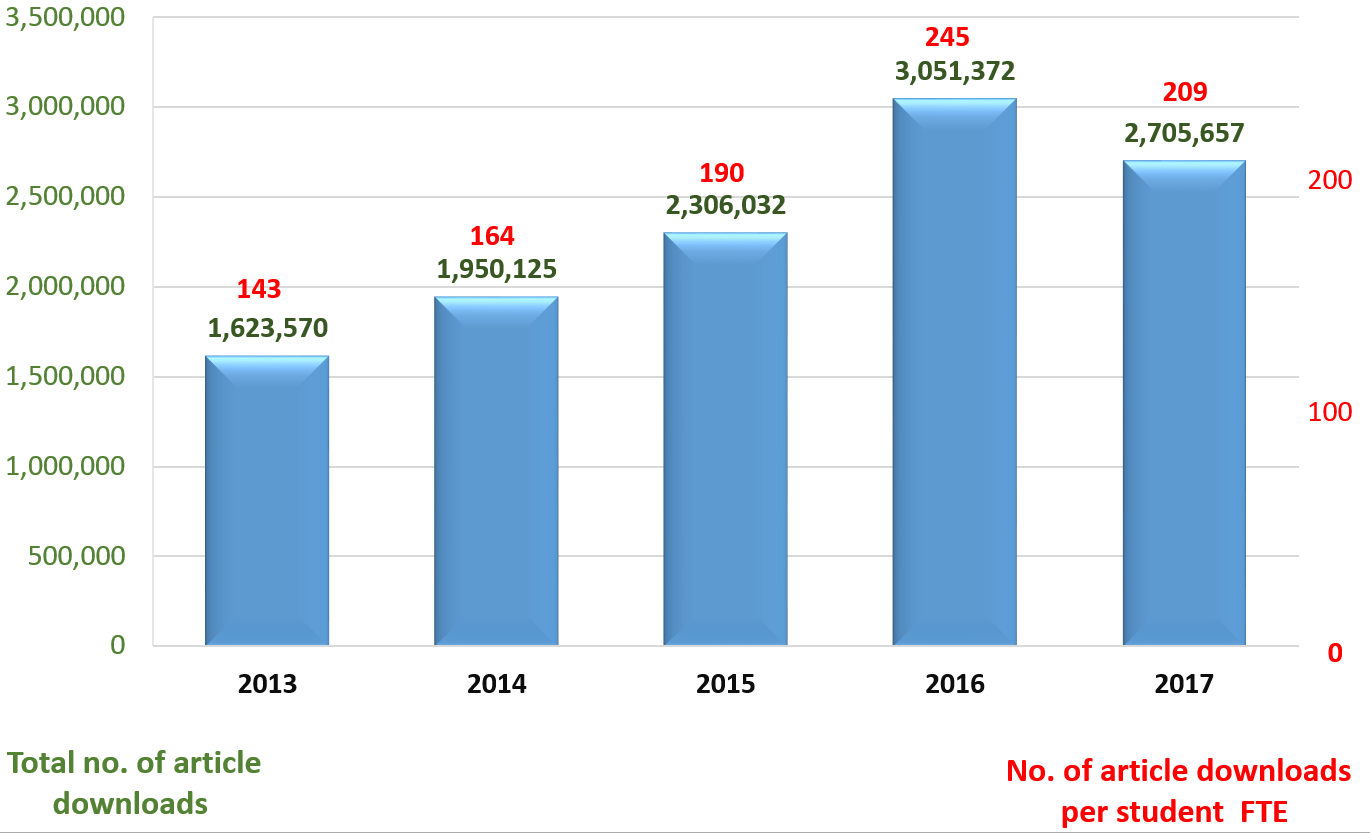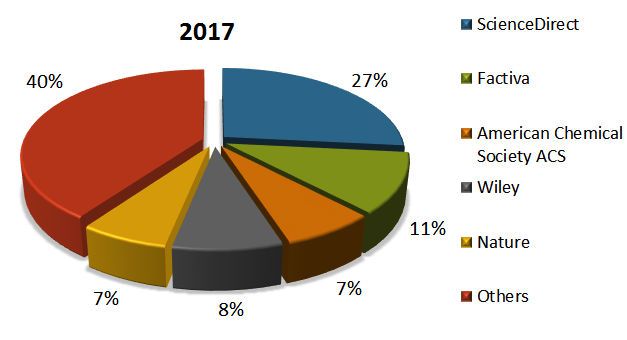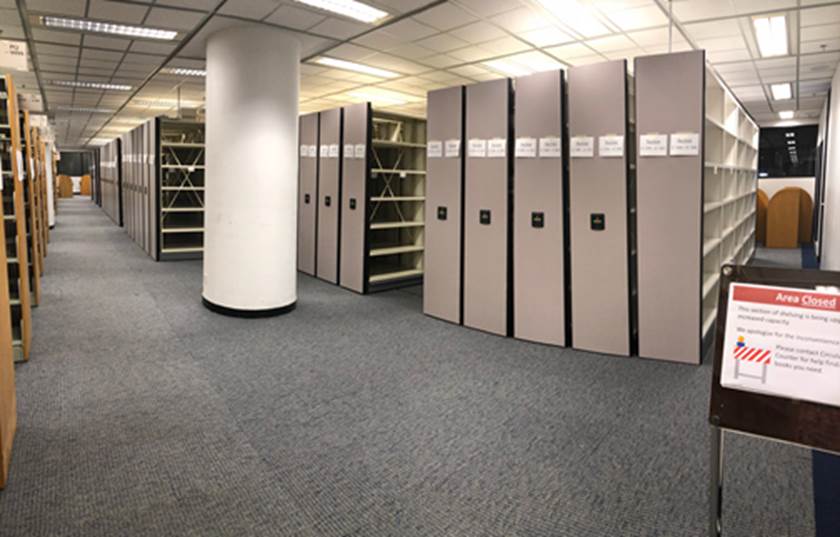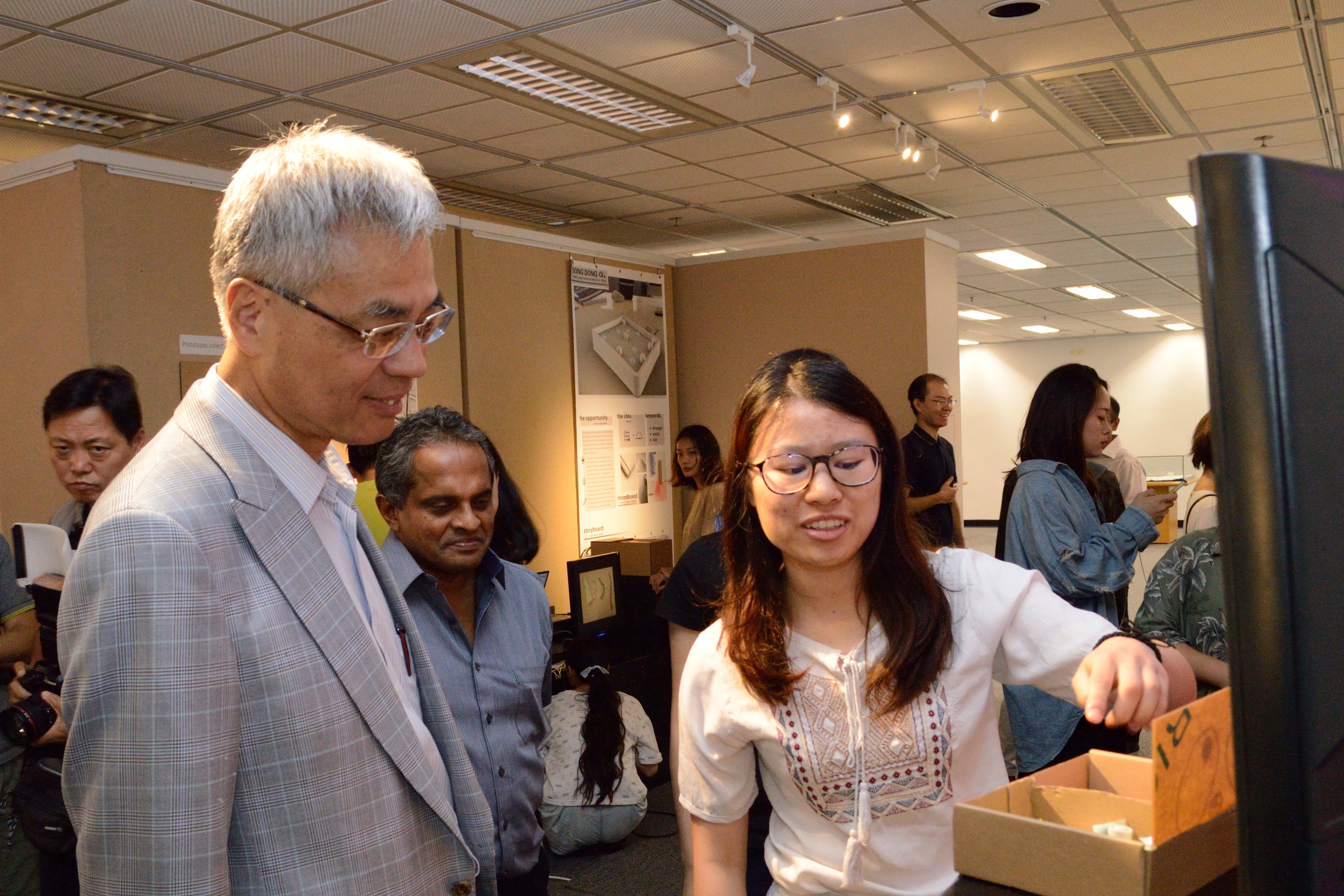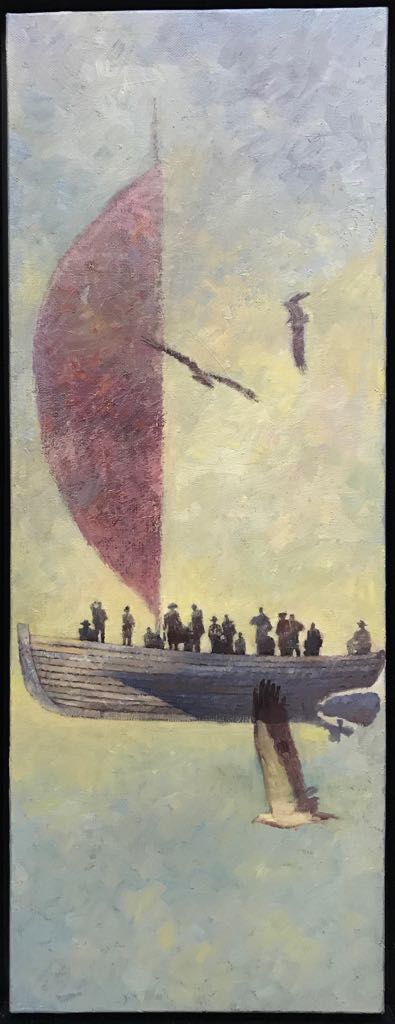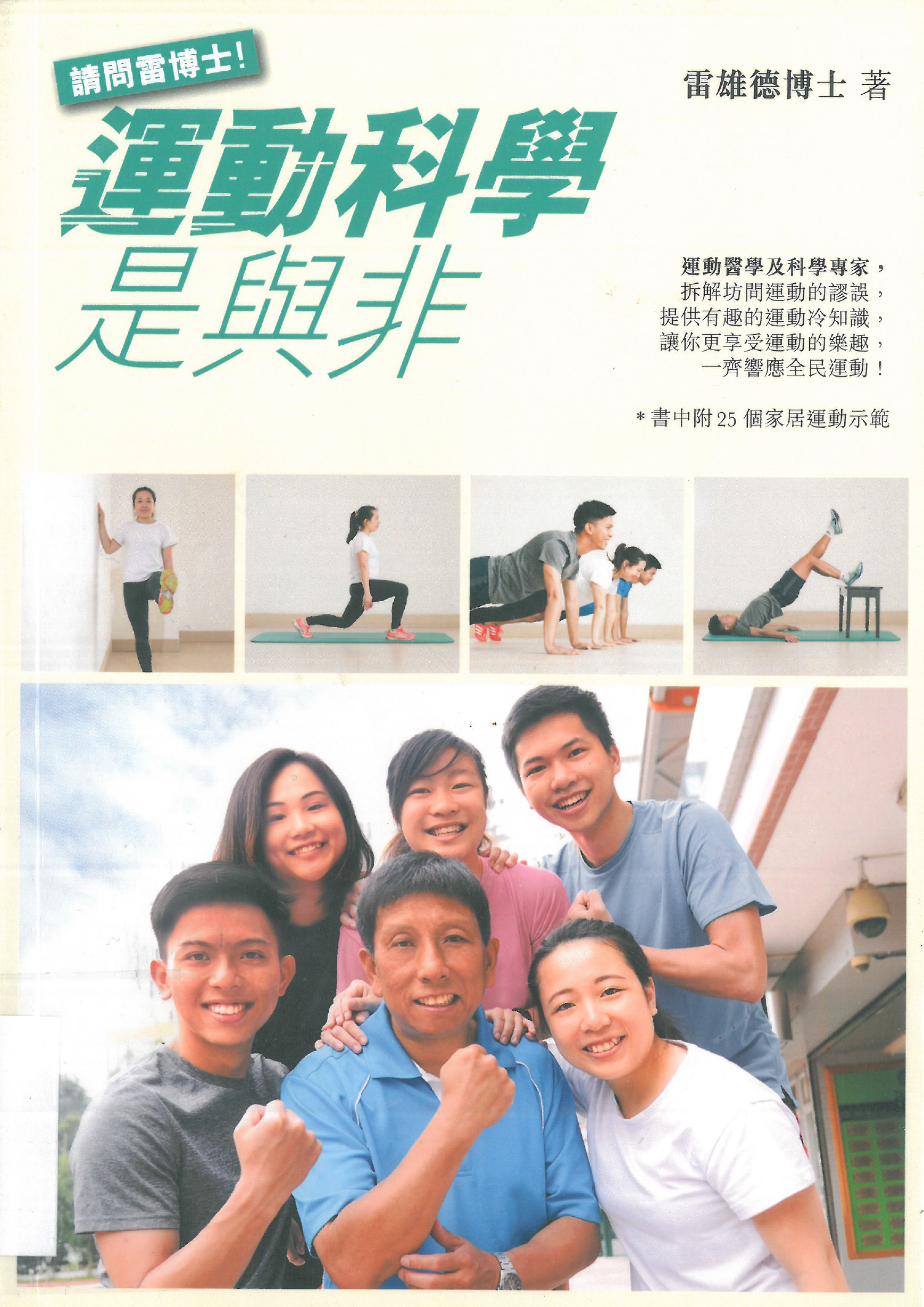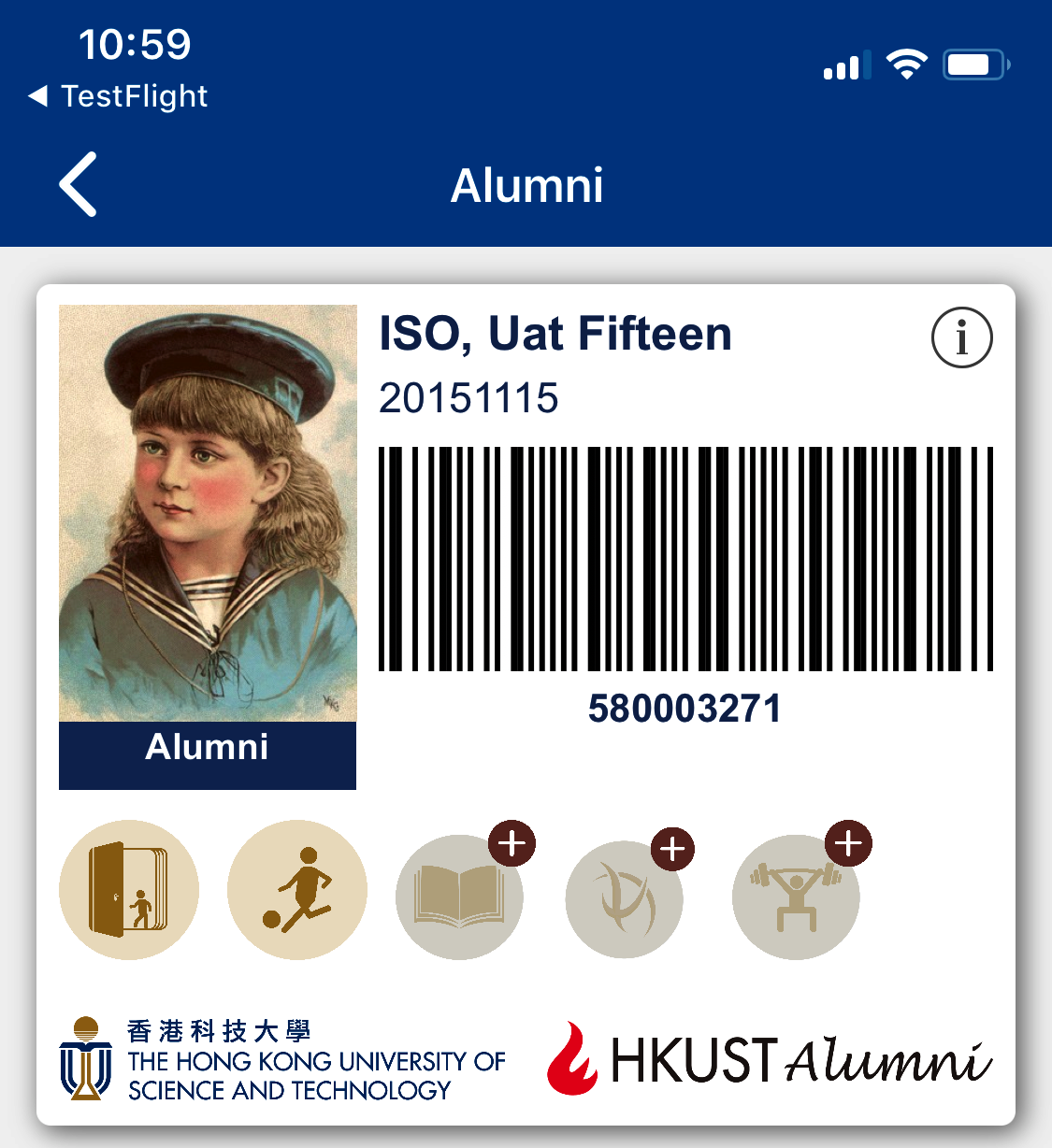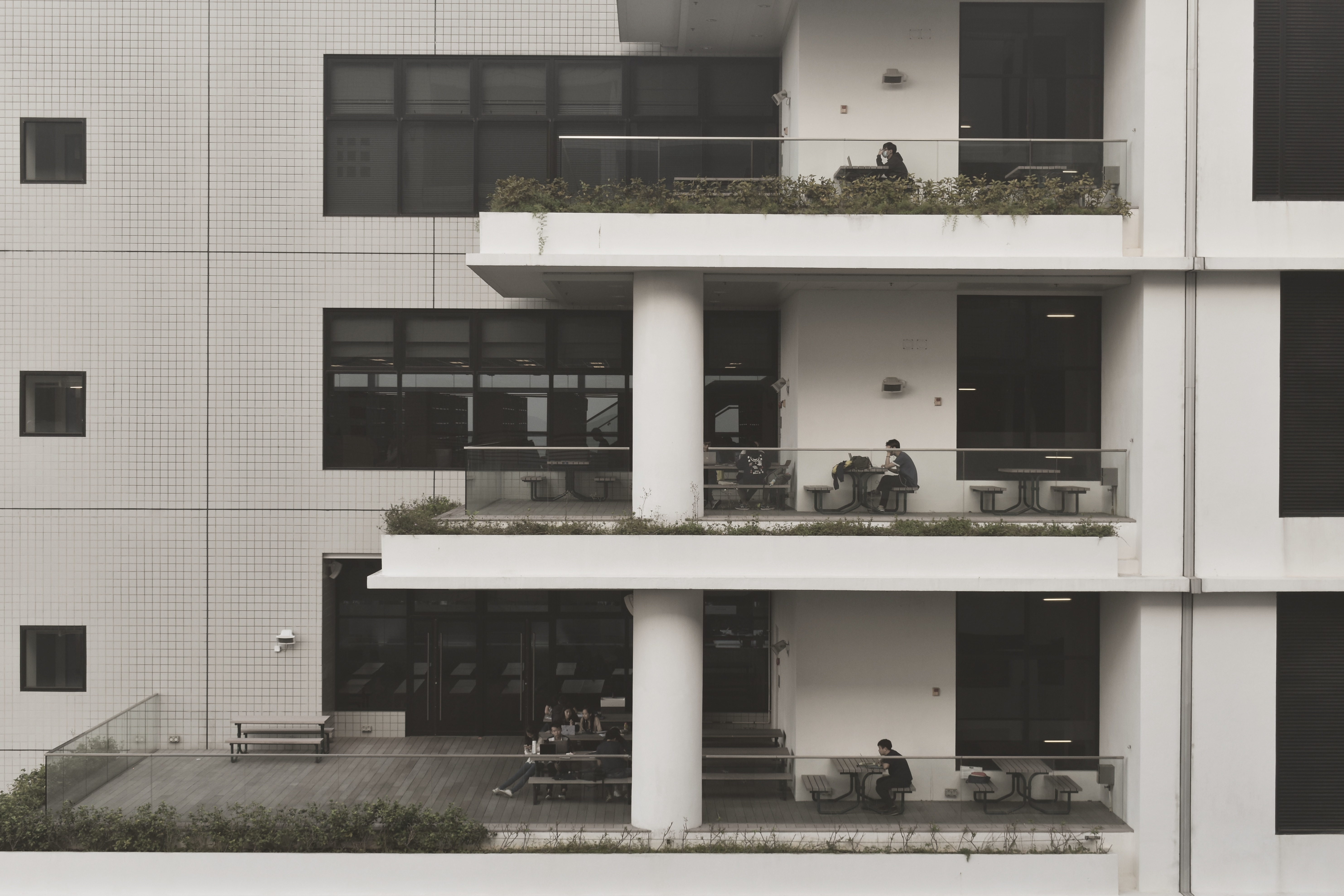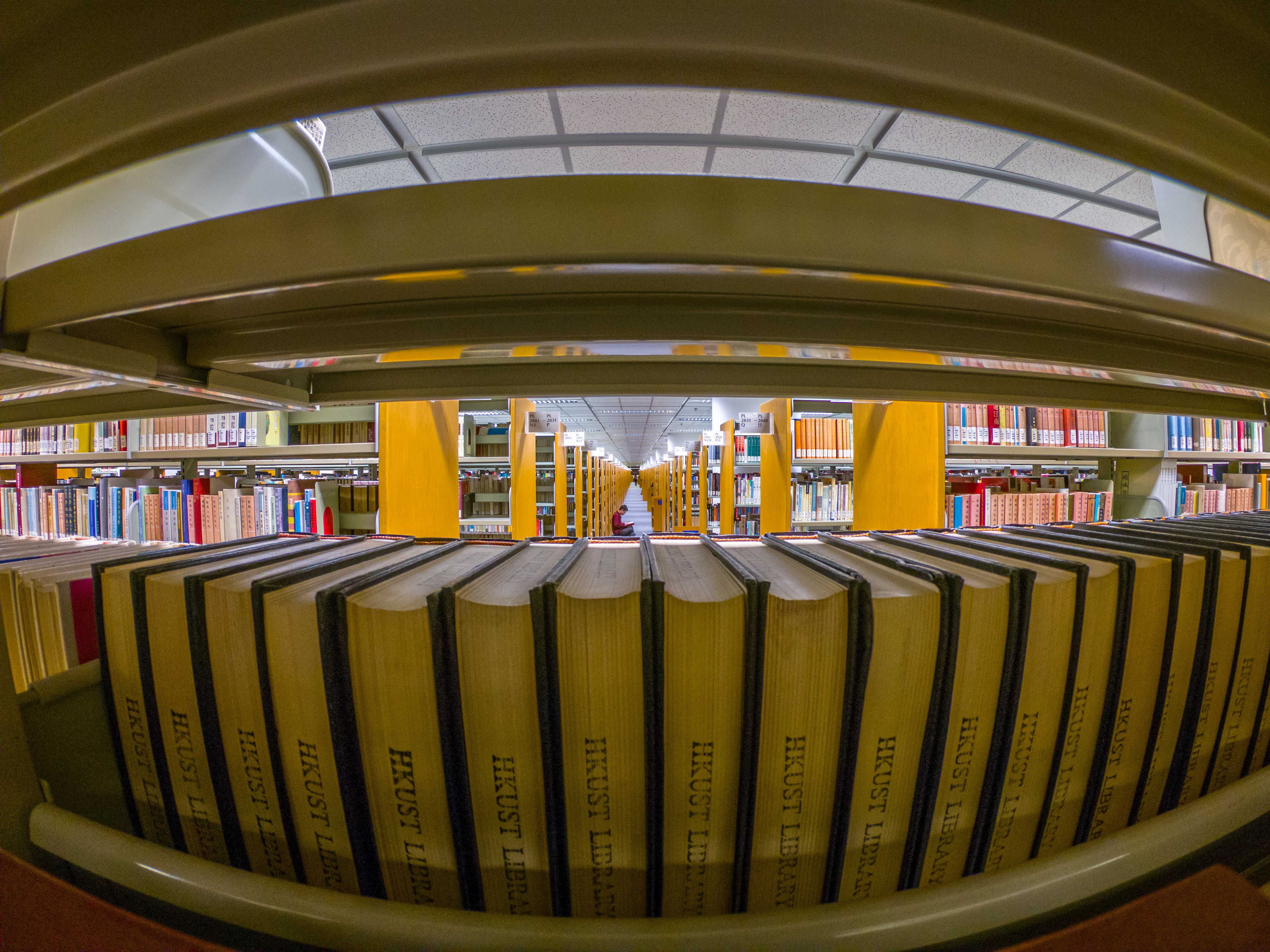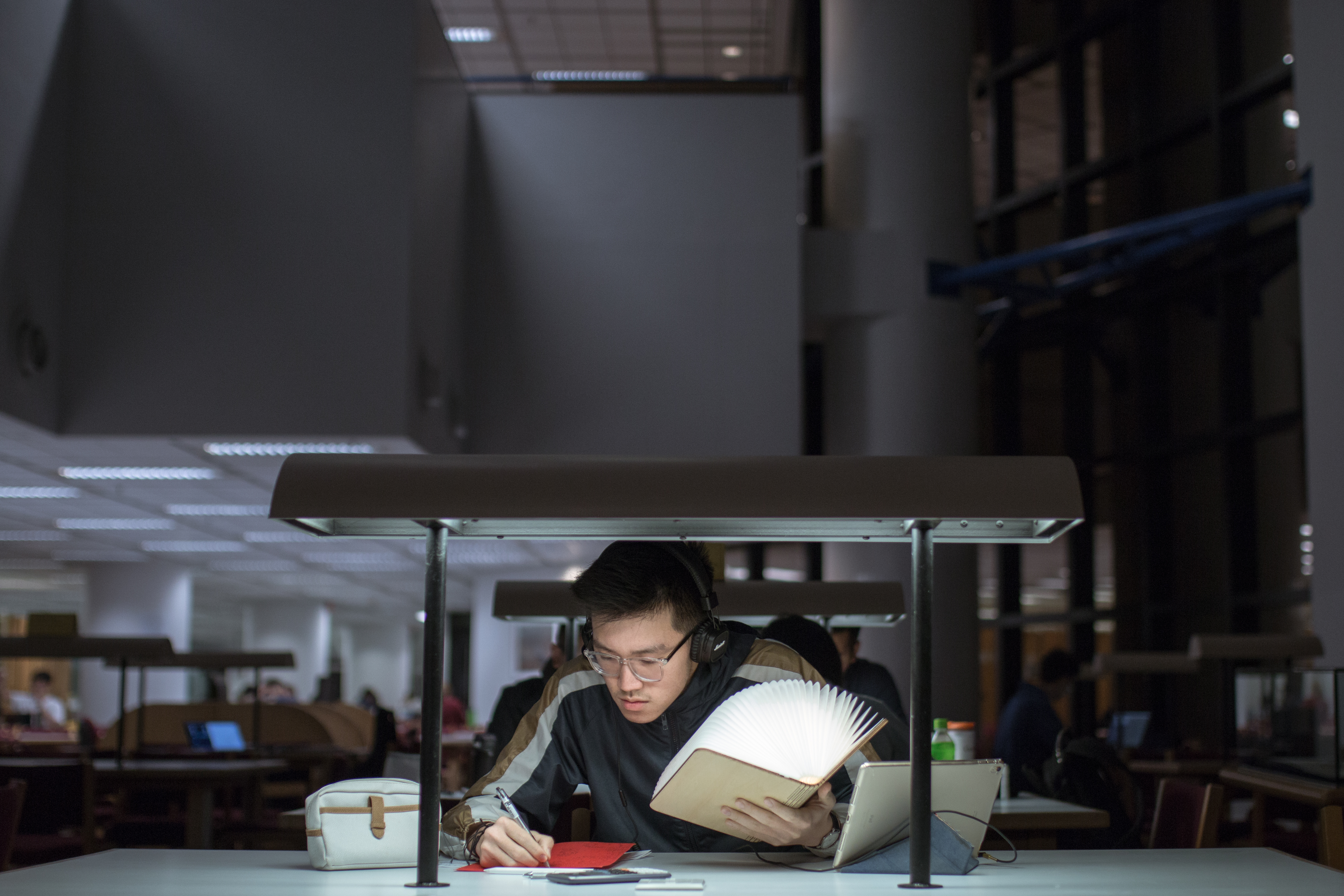
Issue No. 109
September 2018
E-Journal Usage : 5-Year Trend
Electronic journals are a daily staple of scholarly research. We have done some analysis of how heavily used our e-journals have been.
The chart below shows the total number of article downloads and the number of article downloads per student FTE for the past five years (from 2013 to 2017). There was a dramatic climb in usage from 2013 to 2015, followed by a huge spike in 2016 which tapered off in 2017.
Unfailingly, ScienceDirect topped the download chart for five consecutive years. The most impressive usage happened in 2014 when ScienceDirect downloads accounted for 37% of the total HKUST e-journal usage for that year.
While usage of most ejournal resources rose and fell, some publishers saw a consistent rise from year to year. Two notable examples are Nature and American Chemical Society (ACS) journals. The number of journals in each collection increased slightly over the years, yet their strong upward usage trend shows no sign of abatement. Nature journal downloads increased from 76,928 in 2013 to 179,552 in 2017 whereas the corresponding figures for ACS journals are 113,607 and 190,911.
Print Book vs E-book Usage
The Library recently studied overall trends in physical visits, book loans and e-book usage. Figure 1 shows the use of e-books compared to loans of print books and physical library visits. Since 2010, there has been a gradual shift from print book to e-book usage. The divergence was particularly marked in 2013 when the Library launched various “demand-driven” and “evidence-based” e-book acquisition programs to support the 334 curriculum changes. Only well-used titles trigger purchases, meaning what the Library buys is what users need.
The number of chapter downloads per FTE student rose from 31 in 2010 to 77 in 2016 while print loans dropped year after year to 11 in 2016. (Fig 1) This is clear evidence of an electronic shift, which is in line with other universities in Hong Kong and abroad.
Figure 2 also shows physical visits per FTE student recorded a steady climb from 2012 when the LG1 Learning Commons opened. Visits dropped slightly after a regulated entrance policy was implemented in 2015. Loans per 1,000 visits are also declining. This reveals that users continue to visit the Library for activities other than borrowing physical books.
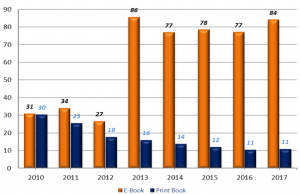 Figure 1: Electronic & Print Book Usage per FTS |
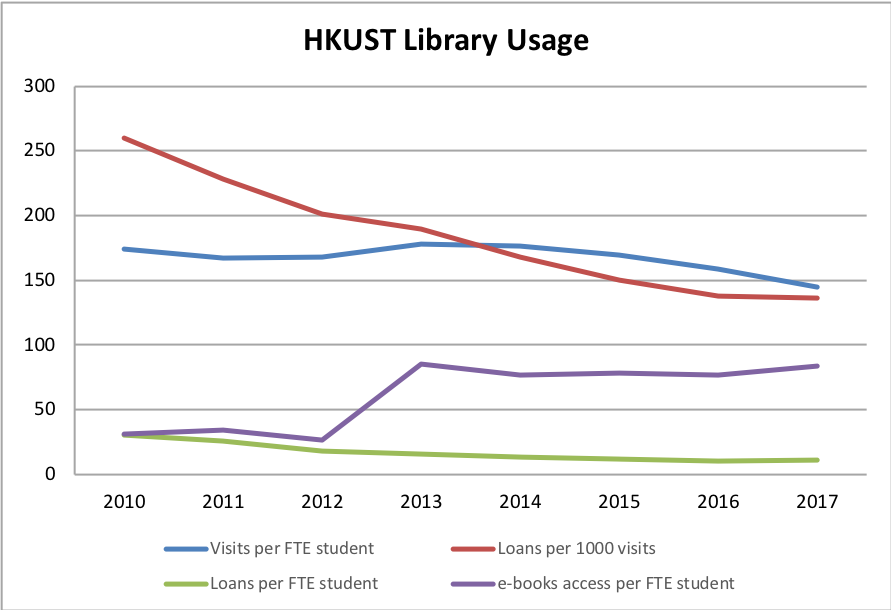 Figure 2: Overall Trends 2010-2017 |
Print vs Electronic: Academic Reading Preferences @HKUST
In September 2017, the Library conducted the Academic Reading Format International Study (ARFIS), an international project investigating students’ attitudes and behaviors in regards to academic reading. So far, 32 different countries and territories have participated.
All UGs and PGs were invited, and 1,136 students responded. Many also made thoughtful comments.
Most prefer all their course readings in print (56.3% agree vs 25.44% disagree). They mention ease of highlighting, the ability to focus mentally, and that reading in print is easier on their eyes.
Students usually highlight or annotate printed readings (81.69% vs 9.77%). They can focus on material better when they read it in print (76.67% vs 7.57%). They remember information from their course readings best when they read them in print (70.07% vs 10.74). And they are more likely to re-read printed readings (68.13% vs 13.65%).
At the same time, many also like both formats, and will do format shifting to have both:
• If their readings are electronic, 59.86% print them
• If they are in print, 46.39% make digital copies
But what about electronic readings? 20-35% of you do prefer electronic over print. More than 1/3 report it more convenient to read material electronically than in print (34.33%). Almost 1/3 prefer to read course material in their native language electronically rather than in print (30.11%); and close to 1/4 prefer electronic textbooks to print textbooks (24.39%).

The many comments revealed some themes:
• Course-readings do not just refer to textbooks; but also notes from lecturers; pdfs on course websites; etc
• Printing out assigned readings is viewed as costly.
• Sustainability matters, printed copies were seen as less environmentally friendly.
• Making annotations is very important and easier with print format.
• Reading e-copies can result in eye-strain.
So what can we conclude?
• Print is not dead, most HKUST students like and use it and find it better for their learning.
• Students value format flexibility, so providing both e-copies and print is important; as well as good facilities for printing e-readings and scanning print.
• HKUST students value protecting the environment and their health and think about that in relation to their learning.
LG3 Compact Shelving
During the Summer the Library was able to convert a portion of regular bookshelves on LG3 into electrically operated compact shelving similar to that on LG4. This roughly doubling of shelving in that area increased our collection capacity by over 30,000 volumes.
Over the years, the Library’s shelving has been getting more and more crowded. University administration has been of great help in supporting various storage expansion options, most notably that provision of off-site high-density shelving for about 70,000 volumes a few years ago forming the “On Call Collection”. The longer-term goal for addressing capacity is a collective plan by all UGC-funded Libraries to create a Joint University Research Archive (JURA). But the JURA is still in the design and funding approval phase and a number of years away from becoming reality.
In the meantime, more space was needed again, and good affordable options were hard to find. Renting off-campus warehouse space, as several other University Libraries have done, seemed excessively costly.
But then the City University Library offered us a set of compact shelving they wanted to get rid of. It was only about ten years old, and still good for another 15 or more years of life. With strong support from the University administration, we decided to pay for the relocation of this shelving to a portion of LG3. We then filled out that area with additional compact shelving from the vendor, still utilizing parts from CityU for about 1/2 of that as well. Overall, the entire installation was done for just 50% of market value for a brand new installation and we should get many years of use out of this expanded capacity.
It is important to note the part played by the Instrumentation Maintenance & Repair Unit (IMR) of the Design & Manufacturing Services Facility (DMSF), who continue to do amazing work maintaining the various compact shelving installations in the Library for the past 25 years. Their efforts are why you encounter so few problems with the system. And their knowledge, research, and innovation area resulting in enormous cost savings throughout.
Exhibitions
In this hot summer the Library held cool exhibitions to help you beat the heat waves:
IELM 4320 Design Thinking – Exhibition 2018. For the fifth year the Library collaborated with the Department of Industrial Engineering & Decision Analytics (IEDA) to showcase the works of students in the Design Thinking course, which is jointly organized with the China Academy of Arts.
Smart Living was the theme for this year. 10 student products were displayed, representing students’ creativity and team work after their study at both HKUST and CAA campuses for 3.5 weeks. President Wei Shyy joined the guided tour on 29 June and was extremely impressed with the product design and innovative creations.
Calligraphic Works from the Library’s Collection. Starting in early August, we have been featuring some of the treasures from our collection in the G/F Gallery. These are donated by renowned local and mainland calligraphers including Jao Tsung-I (饒宗頤) and Sze Chi Ching (施子清). We also put up displays of Manny Ling’s western calligraphy in the G/F hallway allowing viewers to appreciate the unique beauty of two different calligraphy types.
My Heart is Flying: Paintings by Chen Keng 我心飛揚 : 陳鏗畫展. With the HKUST Center for the Arts and Publishing Technology Center, the Library will feature 50 artworks specially painted by Mr Chen for HKUST around the theme “Flying”. The opening will be held on 12 September.
The exhibition is an Artist-in-resident project supported by the EVPP Office, with talks, workshops, and demonstrations.
Three Years and Eight Months: Hong Kong during the Japanese Occupation 三年零八個月:日佔時期的香港. In the Special Collections Gallery on 1/F, we will have a new display on Hong Kong’s history, featuring over 100 photos and artifacts from the three years and eight months when Hong Kong was under Japanese occupation. The exhibits are loaned from a collector, Mr Cheng Po Hung, who is an Honorary Adviser to the Hong Kong Museum of History, Hong Kong Heritage Museum, and University Museum and Art Gallery of HKU.
The exhibition will open on 4 October. There will be guided tours and other activities including a talk by Humanities Prof Cheung Siu Woo in November.
New Book Talk Series
This year the Library has planned a number of interesting book talks on diverse topics.
On 26 September, Dr Lobo Louie (雷雄德博士) will talk on his book “請問雷博士!運動科學是與非”. There are many myths and misconceptions related to exercise, and information about exercise and fitness training can sometimes be hard to separate fact from fiction. In this talk, Dr Louie will try to dispel some common exercise misconceptions. Dr Louie is currently the Associate Professor in the Department of Physical Education at the Hong Kong Baptist University. He also serves as the Associate Director of the Dr Stephen Hui Research Center for Physical Recreation & Wellness, and the President of the Hong Kong Association Sports Medicine.
On 24 October, Prof Stuart Gietel-Basten will deliver a talk on his first book “Why Demography Matters” (Call number: HB871 D67 2018). While discussion of demography traditionally has focused on the consequences of population growth. Prof Gietel-Basten will share his insight on how our understanding of demographics can influence politics and populations. He will also suggest that human can take greater ownership of the future by better understanding the role demography has played.
Prof Stuart Gietel-Basten is Associate Director of the Leadership and Public Policy Executive Education Program, and Associate Professor of Department of Social Science and Institute for Public Policy at HKUST. His research covers the links between population and policy, with a regional focus on Asia. Prof Gietel-Basten has been published in a number of major journals in demography and other social science subjects. He is also a regular contributor to the South China Morning Post and China Daily.
Mark your calendar and watch out for the Library announcements. We look forward to seeing you at the talks.
Library Supports Alumni E-Card
The HKUST Library now supports the Alumni E-Card for entry and borrowing.
New barcode readers have been installed in the entry gate and at the Circulation Counter.
Library Photo Contest 2018
The first Library photo contest has successfully concluded with 92 wonderful submissions from 57 participants (52 students and 5 staff members). Congratulations to all winners! Entries can be viewed at (http://library.hkust.edu.hk/about-us/user-engagement/photo-contest-2018/).
• Grand Prize: Let’s Study by Yat Hei Tam (CIVL)
• 1st Runner up: If Books Have Eyes at HKUST Library by Ben Xu (ECE)
• 2nd Runner Up: The Tetris Journey by Bhawat Traipattanakul (MECH)
• 2nd Runner Up: Eureka by Reno Adley Prawoto
• Most Facebook “Likes”: Photographer in Library by Pak Wing Yu (RMBI)
Their joyful moments were captured at the Prize Presentation Ceremony.
The contest theme was Day and Night @ the Library! – Show the Library Through Your Eyes.
The photos are also shared by HKUST Alumni on Facebook with the description “Walking down memory lane. Remember times that were spent in this library?”. It is a heartwarming feeling to know that the Library constitutes part of their good, fond memory of HKUST.
Thank you all for your support, we look forward to our next photo contest very soon.
Service and Staff Re-alignment
In response to the recent migration of library systems, and to consolidate library services in research support and learning space management, we have realigned our service and staff in three fronts.
Library staff help in different stages of the life cycle of research projects. We offer assistance from the literature search of a topic, to the dissertation submission, and research output publishing. Library staff have been helping researchers set up scholar profiles and create ORCIDs, rendering advice on open journal publishing, and running impact metrics and citations certifications. At the institutional level, we have created the HKUST Scholarly Publications Database (SPD) to manage and highlight your research outputs. We also take part in the research assessment exercise and university rankings.
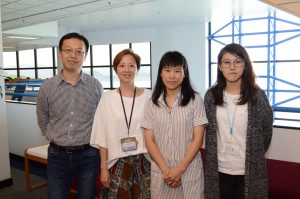 To consolidate efforts and improve outreach, the Library has formed a new unit, Research Support Services, to coordinate these activities. Led by Gabrielle Wong, the new unit includes Kevin Ho, Anchovy Tso, and Joanne Chan. Reaching out to departments to learn their priorities and needs, the unit will design and launch new services, strengthen existing workflows in SPD, and streamline scholar profiles and research output management system.
To consolidate efforts and improve outreach, the Library has formed a new unit, Research Support Services, to coordinate these activities. Led by Gabrielle Wong, the new unit includes Kevin Ho, Anchovy Tso, and Joanne Chan. Reaching out to departments to learn their priorities and needs, the unit will design and launch new services, strengthen existing workflows in SPD, and streamline scholar profiles and research output management system.
A second re-alignment concerns the acquisition and cataloging of library materials. The new Alma System by Ex Libris offers very different workflows in ordering, receiving, and cataloging library materials. The Library handled about 10,000 orders and catalogued 150,000 items last year, about 80% being electronic. There are unique issues dealing with e-resources such as licensing agreements, perpetual access, access links, user interface, etc. To reduce repetition and streamline workflows, Technical Services has been restructured and renamed Resource Management, with sub-teams for Monographs and Serials and Media. Each sub-team handles a complete workflow from acquisition to cataloging. Together they aim to enable users to access newly acquired resources in the fastest and most effective way.
A third re-alignment relates to the Learning Commons, which is being managed by the Access Service team. Becky Lee is now the Commons and Media Resources Manager.
last modified 03 September 2018

